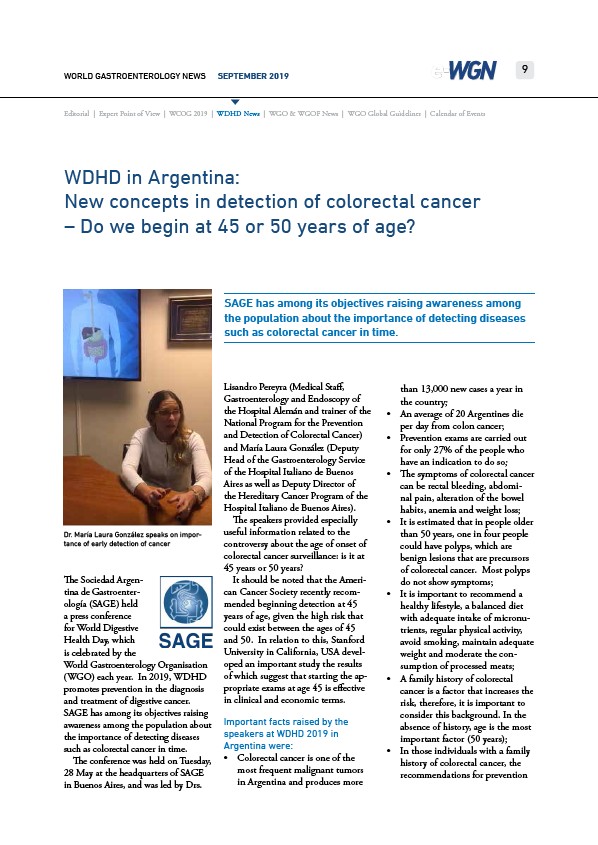
9
WORLD GASTROENTEROLOGY NEWS SEPTEMBER 2019
Editorial | Expert Point of View | WCOG 2019 | WDHD News | WGO & WGOF News | WGO Global Guidelines | Calendar of Events
WDHD in Argentina:
New concepts in detection of colorectal cancer
– Do we begin at 45 or 50 years of age?
The Sociedad Argentina
de Gastroenterología
(SAGE) held
a press conference
for World Digestive
Health Day, which
is celebrated by the
World Gastroenterology Organisation
(WGO) each year. In 2019, WDHD
promotes prevention in the diagnosis
and treatment of digestive cancer.
SAGE has among its objectives raising
awareness among the population about
the importance of detecting diseases
such as colorectal cancer in time.
The conference was held on Tuesday,
28 May at the headquarters of SAGE
in Buenos Aires, and was led by Drs.
SAGE has among its objectives raising awareness among
the population about the importance of detecting diseases
such as colorectal cancer in time.
Lisandro Pereyra (Medical Staff,
Gastroenterology and Endoscopy of
the Hospital Alemán and trainer of the
National Program for the Prevention
and Detection of Colorectal Cancer)
and María Laura González (Deputy
Head of the Gastroenterology Service
of the Hospital Italiano de Buenos
Aires as well as Deputy Director of
the Hereditary Cancer Program of the
Hospital Italiano de Buenos Aires).
The speakers provided especially
useful information related to the
controversy about the age of onset of
colorectal cancer surveillance: is it at
45 years or 50 years?
It should be noted that the American
Cancer Society recently recommended
beginning detection at 45
years of age, given the high risk that
could exist between the ages of 45
and 50. In relation to this, Stanford
University in California, USA developed
an important study the results
of which suggest that starting the appropriate
exams at age 45 is effective
in clinical and economic terms.
Important facts raised by the
speakers at WDHD 2019 in
Argentina were:
• Colorectal cancer is one of the
most frequent malignant tumors
in Argentina and produces more
than 13,000 new cases a year in
the country;
• An average of 20 Argentines die
per day from colon cancer;
• Prevention exams are carried out
for only 27% of the people who
have an indication to do so;
• The symptoms of colorectal cancer
can be rectal bleeding, abdominal
pain, alteration of the bowel
habits, anemia and weight loss;
• It is estimated that in people older
than 50 years, one in four people
could have polyps, which are
benign lesions that are precursors
of colorectal cancer. Most polyps
do not show symptoms;
• It is important to recommend a
healthy lifestyle, a balanced diet
with adequate intake of micronutrients,
regular physical activity,
avoid smoking, maintain adequate
weight and moderate the consumption
of processed meats;
• A family history of colorectal
cancer is a factor that increases the
risk, therefore, it is important to
consider this background. In the
absence of history, age is the most
important factor (50 years);
• In those individuals with a family
history of colorectal cancer, the
recommendations for prevention
Dr. María Laura González speaks on importance
of early detection of cancer